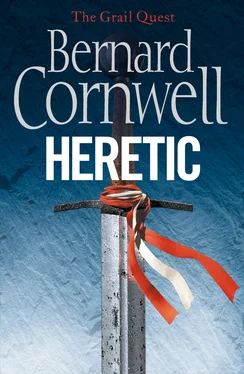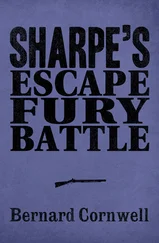The watchman reappeared, but only strolled halfway up the wall where he paused, leaned on the parapet for a time, then wandered back towards the gate. A moment later there was a soft whistle, jagged and tuneless like the song of a bird, and the friar went back to the cord and hauled it up. Knotted to it now was a rope, which he tied around the crenellation. ‘It’s safe,’ he called softly in English, and then flinched at the sound of a man’s boots scuffing on the wall as he climbed the rope.
There was a grunt as the man hauled himself up the rampart and a loud crash as his scabbard thumped on the stone, but then the man was over and crouching beside the friar. ‘Here.’ He gave the friar an English war bow and a bag of arrows. Another man was climbing now. He had a war bow slung on his back and a bag of arrows at his waist. He was more nimble than the first man and made no noise as he crossed the battlement, and then a third man appeared and crouched with the other two.
‘How was it?’ the first man asked the friar.
‘Frightening.’
‘They didn’t suspect you?’
‘Made me read some Latin to prove I was a priest.’
‘Bloody fools, eh?’ the man said. He had a Scottish accent. ‘So what now?’
‘The castle.’
‘Christ help us.’
‘He has so far. How are you, Sam?’
‘Thirsty,’ one of the other men answered.
‘Hold these for me,’ Thomas said, giving Sam his bow and arrow bag, and then, satisfied that the watchman was out of sight, he led his three companions down the wooden steps to the alley which led beside the church to the small square in front of the castle’s gate. The wooden faggots piled ready for the heretic’s death were black in the moonlight. A stake with a chain to hold the beghard’s waist jutted up from the waiting timber.
The castle’s tall gates were wide enough to let a farm cart enter the courtyard, but set into one leaf was a small wicket gate and the friar stepped ahead of his companions and thumped the small door hard. There was a pause, then a shuffle of feet sounded and a man asked a question from the gate’s far side. Thomas did not answer, but just knocked again, and the guard, who was expecting his companions to come back from the tavern, suspected nothing and pulled back the two bolts to open the door. Thomas stepped into the flamelight of two high torches burning in the inner archway and in their flickering glow he saw the guard’s look of astonishment that a priest had come to Castillon d’Arbizon’s castle in the darkness, and the man still looked astonished as the friar hit him hard, straight in the face, and then again in the belly. The guard fell back against the wall and the friar clamped a hand across the man’s mouth. Sam and the other two came through the gate, which they locked behind them. The guard was struggling and Thomas brought up a knee which made the man give a muffled squeal. ‘Look in the guardroom,’ Thomas ordered his companions.
Sam, with an arrow on his bow’s string, pushed open the door which led from the castle’s entrance. A single guard was there, standing by a table on which was a skin of wine, two dice and a scatter of coins. The guard stared at Sam’s round, cheerful face and he was still gazing open-mouthed when the arrow took him in the chest and threw him back against the wall. Sam followed, drawing a knife, and blood slashed up the stones as he cut the man’s gullet.
‘Did he have to die?’ Thomas asked, bringing the first guard into the room.
‘He was looking at me funny,’ Sam said, ‘like he’d seen a ghost.’ He scooped up the cash on the table and dropped it into his arrow bag. ‘Shall I kill him too?’ he asked, nodding at the first guard.
‘No,’ Thomas said. ‘Robbie? Tie him up.’
‘What if he makes a noise?’ Robbie, the Scotsman, asked.
‘Then let Sam kill him.’
The third of Thomas’s men came into the guardroom. He was called Jake and he was a skinny man with crossed eyes. He grinned at the sight of the fresh blood on the wall. Like Sam he carried a bow and an arrow bag, and had a sword at his waist. He picked up the wine skin.
‘Not now, Jake,’ Thomas said and the lanky man, who looked older and far more cruel than the younger Thomas, meekly obeyed. Thomas went to the guardroom door. He knew the garrison numbered ten men, he also knew that one was dead, one was a prisoner and at least three were still in the tavern. So five men could be left. He peered into the courtyard, but it was empty except for a farm wagon heaped with bales and barrels, and so he crossed to the weapon rack on the guardroom wall and selected a short sword. He tested the edge and found it sharp enough. ‘Do you speak French?’ he asked the captive guard.
The man shook his head, too terrified to speak.
Thomas left Sam to guard the prisoner. ‘If anyone knocks on the castle gate,’ he said, ‘ignore it. If he makes a noise,’ he jerked his head towards the prisoner, ‘kill him. Don’t drink the wine. Stay awake.’ He slung his bow on his shoulder, pushed two arrows into the rope belting his friar’s robe, then beckoned to Jake and Robbie. The Scotsman, dressed in a short mail hauberk, had his sword drawn. ‘Keep it silent,’ Thomas said to them, and the three slipped into the courtyard.
Castillon d’Arbizon had been at peace for too long. The garrison was small and careless, its duties little more than to levy tariffs on goods coming to the town and despatching the taxes to Berat where their lord lived. The men had become lazy, but Thomas of Hookton, who had pretended to be a friar, had been fighting for months and his instincts were those of a man who knew that death could be waiting at every corner. Robbie, though he was three years younger than Thomas, was almost as experienced in war as his friend, while cross-eyed Jake had been a killer all his life.
They began with the castle’s undercroft where six dungeons lay in fetid darkness, but a flickering rush-light showed in the jailer’s room where they found a monstrously fat man and his equally corpulent wife. Both were sleeping. Thomas pricked the man’s neck with the sword’s point to let him smell blood, then marched the couple to a dungeon where they were locked away. A girl called from another of the cells, but Thomas hissed at her to be quiet. She cursed him in return, then went silent.
One down, four to go.
They climbed back to the courtyard. Three servants, two of them boys, were sleeping in the stables and Robbie and Jake took them down to the cells, then rejoined Thomas to climb the dozen broad steps to the keep’s door, then up the tower’s winding stair. The servants, Thomas guessed, would not be numbered among the garrison, and there would doubtless be other servants, cooks and grooms and clerks, but for now he worried only about the soldiers. He found two of them fast asleep in the barracks room, both with women under their blankets, and Thomas woke them by tossing in a torch he took from a becket on the stairway. The four sat up, startled, to see a friar with an arrow nocked on his drawn bow. One woman took breath to scream, but the bow twitched and the arrow was pointing straight at her right eye and she had the sense to stifle her alarm.
‘Tie them up,’ Thomas said.
‘Quicker to slit their gizzards,’ Jake suggested.
‘Tie them up,’ Thomas said again, ‘and stuff their mouths.’
It did not take long. Robbie ripped a blanket into strips with his sword and Jake trussed the four. One of the women was naked and Jake grinned as he tied her wrists and then hoisted her up to a hook on the wall so that her arms were stretched. ‘Nice,’ he said.
‘Later,’ Thomas said. He was at the door, listening. There could be two more soldiers in the castle, but he heard nothing. The four prisoners were all being half suspended from the big metal hooks that normally held swords and mail shirts and, when the four were silenced and immobilized, Thomas went up the next winding stair to where a great door blocked his path. Jake and Robbie followed him, their boots making a slight noise on the worn stone steps. Thomas motioned them to silence, then pushed on the door. For a moment he thought it must be locked, but he pushed again, harder, and the door jerked open with a terrible shriek of rusted metal hinges. The sound was fit to wake the dead and Thomas, appalled, found himself staring into a great high room hung with tapestries. The squeal of the hinges died away, leaving silence. The remnants of a fire burned in a big hearth and gave enough light to show that the hall was empty. At its far end was a dais where the Count of Berat, the Lord of Castillon d’Arbizon, would sit when he visited the town and where his table would be placed for any feasts. The dais was empty now, except that at its rear, hidden by a tapestry, there was an arched space where another flicker of light showed through the moth-eaten weave.
Читать дальше












